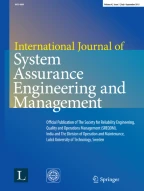Abstract
Inspection is widely used in industry to identify the status of plant and make maintenance decisions. The maintenance models using the delay time concept for optimizing the inspection intervals have been researched for years. However, the three-stage failure process proposed by Wang is closer to reality and provides more modeling options. Imperfect maintenance is common in practice, but not considered based on the three-stage failure process before. An inspection maintenance model based on a three-stage failure process with imperfect maintenance is proposed. The maintenance at minor defect is assumed to be imperfect, but perfect at severe defect. Replacement is implemented at failure. Age reduction concept is utilized to describe the effect of imperfect maintenance. The expected renewed cycle downtime per unit time is derived. Finally, Monte Carlo simulation is presented to show the efficiency of the proposed model.
Similar content being viewed by others
References
Christer AH (1976) Innovative decision making. In Proceedings of the NATO Conference On The Role And Effectiveness Of Theories Of Decision In Practice. Hodder and Stoughton: 368–377
Christer AH (1999) Developments in delay time analysis for modelling plant maintenance. J Oper Res Soc 50:1120–1137
Christer AH, Wang W (1995) A delay time based maintenance model of a multi-component system. IMA J Math Appl Bus Ind 6:205–222
Christer AH, Wang W, Baker RD, Sharp JM (1995) Modelling maintenance practice of production plant using the delay-time concept. IMA J Manag Math 6:67–83
Doyen L, Gaudoin O (2004) Classes of imperfect repair models based on reduction of failure intensity or virtual age. Reliab Eng Syst Saf 84:45–56
Martorell S, Sanchez A, Serradell V (1999) Age-dependent reliability model considering effects of maintenance and working conditions. Reliab Eng Syst Saf 64:19–31
Pham H, Wang H (1996) Imperfect maintenance. Eur J Oper Res 94:425–438
Redmond DF, Christer AH, Rigden SR, Burley E, Tajelli A, Abu-Tair A (1997) O.R.modelling of the deterioration and maintenance of concrete structures. Eur J Oper Res 99:619–631
Ross SM (2003) Introduction to probability models, 8th edn. Academic Press, San Diego
Shin I, Lim TJ, Lie CH (1996) Estimating parameters of intensity function and maintenance effect for repairable unit. Reliab Eng Syst Saf 54:1–10
Taghipour S, Banjevic D, Jardine AKS (2010) Periodic inspection optimization model for a complex repairable system. Reliab Eng Syst Saf 95(9):944–952
Wang W (2008) Delay time modelling. Complex system maintenance handbook. Springer, London, pp 345–370
Wang W (2011) An inspection model based on a three-stage failure process. Reliab Eng Syst Saf 96(7):838–848
Wang W (2012) An overview of the recent advances in delay-time-based maintenance modelling. Reliab Eng Syst Saf 106:165–178
Wang W (2013) Models of inspection, routine service, and replacement for a serviceable one-component system. Reliab Eng Syst Saf 116:57–63
Wang W, Scarf PA, Smith MAJ (2000) On the application of a model of condition-based maintenance. J Oper Res Soc 51(2):1218–1227
Wang L, Hu HJ, Wang YQ, Wu W, He PF (2011) The availability model and parameters estimation method for the delay time model with imperfect maintenance at inspection. Appl Math Model 35:2855–2863
Wang W, Zhao F, Peng R (2014) A preventive maintenance model with a two-level inspection policy based on a three-stage failure process. Reliab Eng Syst Saf 121:207–220
Zhao J, Chan AHC, Roberts C, Madelin KB (2007) Reliability evaluation and optimization of imperfect inspections for a component with multi-defects. Reliab Eng Syst Saf 92(1):65–73
Author information
Authors and Affiliations
Corresponding author
Rights and permissions
About this article
Cite this article
Yang, R., Yan, Z. & Kang, J. An inspection maintenance model based on a three-stage failure process with imperfect maintenance via Monte Carlo simulation. Int J Syst Assur Eng Manag 6, 231–237 (2015). https://doi.org/10.1007/s13198-014-0292-8
Received:
Revised:
Published:
Issue Date:
DOI: https://doi.org/10.1007/s13198-014-0292-8
